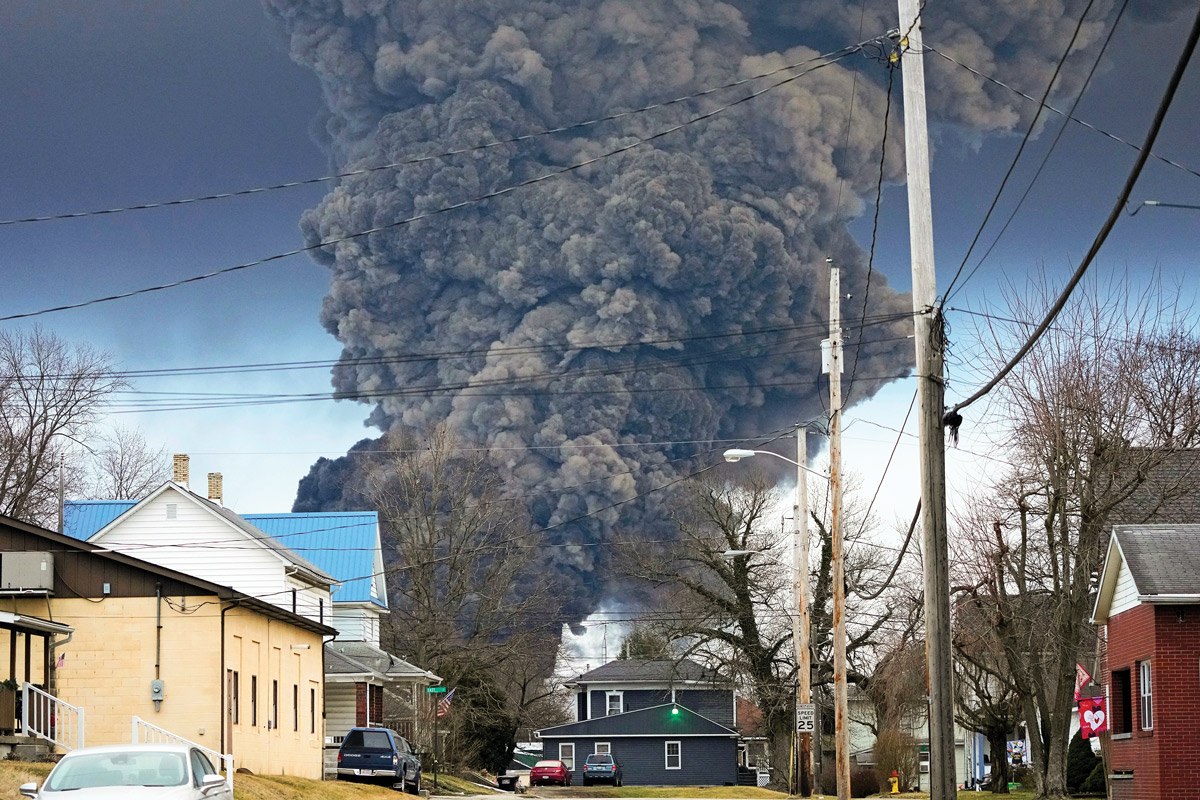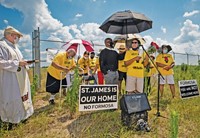Advertisement
Grab your lab coat. Let's get started
Welcome!
Welcome!
Create an account below to get 6 C&EN articles per month, receive newsletters and more - all free.
It seems this is your first time logging in online. Please enter the following information to continue.
As an ACS member you automatically get access to this site. All we need is few more details to create your reading experience.
Not you? Sign in with a different account.
Not you? Sign in with a different account.
ERROR 1
ERROR 1
ERROR 2
ERROR 2
ERROR 2
ERROR 2
ERROR 2
Password and Confirm password must match.
If you have an ACS member number, please enter it here so we can link this account to your membership. (optional)
ERROR 2
ACS values your privacy. By submitting your information, you are gaining access to C&EN and subscribing to our weekly newsletter. We use the information you provide to make your reading experience better, and we will never sell your data to third party members.
Awards
Movers And Shakers
Wilma Subra: An unstoppable pioneer in environmental chemistry and community advocacy
Venerated in industrial fence-line communities, Wilma Subra covers the nation from New Iberia, Louisiana
by Rick Mullin
January 17, 2020
| A version of this story appeared in
Volume 98, Issue 3

“I don’t actually live here,” says Wilma Subra, moving through the living room to the kitchen of a small house that serves as the offices of her environmental consulting business near the Bayou Teche in New Iberia, Louisiana.
She evidently spends a lot of time at the office.
Stacks of file folders, papers, charts, graphs, and photographs, some nearly a foot high, cover every surface other than the kitchen table, where we are seated for an interview. Before long, she is up again, bringing papers to the table and diving into the data.
The apparent level of activity is daunting, considering that Subra Company is a one-woman shop. But one would expect to find reams of documentation at any shop housing statistics on emissions from chemical, refining, and waste management facilities across the country and their health impact on nearby communities.
Subra, 76, is often described in the press as grandmotherly. She is, in fact, a grandmother. Some of the papers in her office—the ones on the refrigerator—are pictures drawn by her grandchildren. She also comes across as a compassionate and patient caregiver in communities that have come to depend on her wisdom, ready access to information, and tireless support. C&EN saw her in action at a meeting she had with residents of Mossville, Louisiana, in 2016.
But a steeliness in her expression speaks to her scientist’s focus on problems and resolve in the face of tough opposition.
Vitals
▸ Age: 76
▸ Birthplace: Morgan City, Louisiana
▸ Education: BS, microbiology and chemistry, 1965, and MS, microbiology and chemistry, 1966, University of Southwestern Louisiana
▸ Employment: Gulf South Research Institute, 1967–81; president, Subra Company, 1981–present
▸ Awards (select): Louisiana Wildlife Federation’s Governor’s State Conservation Achievement Award, 1989;; MacArthur Fellowship, 1999; Catholic Diocese of Lafayette’s Dr. Martin Luther King, Jr. Award, 2003; Global Exchange’s Domestic Human Rights Award, 2011
▸ Committee membership (select): Louisiana Emergency Response Commission, 1988–92; chair, Solid Waste AdvisorsSubcommittee, Louisiana Department of Environmental Quality, 1990–93; vice-chair,.EPA National Advisory Council for Environmental Policy and Technology, 1999–2005;. Pennsylvania hydraulic fracturing regulatory review, 2010
▸ Celebrity engagement: Worked with Don Henley of the band the Eagles on cleanup of a Superfund site in Uncertain, Texas
“I’ve had break-ins,” she says. “One day when my glass man came to change the glass, he said, ‘This is the last time. Call the guy in town and get him to put up burglar screens.’ So now I just get rotten eggs and things like that.”
And then there was the drive-by shooting several years ago. “My husband was working in the flower bed about 7:00 p.m.—here you wait till things get a bit cool,” she recounts. Their home is around the corner from the office. “This car was going by really slow, and when it came this way, the passenger shot at the building.”
When the police stopped the car at the traffic light up the road, Subra says, the gun and passenger were gone. “They wouldn’t tell me who the driver was because it would infringe on his civil rights,” she adds.
Subra assumes that local people are being paid to harass her. “I can always name two or three people who are opposed to what I’m doing,” she says. No doubt: Subra has spent decades challenging industry on development and environmental issues and educating communities near industrial operations to do the same.
Subra got busy with both chemistry and record keeping at a young age. The oldest of six girls in her family, she helped her father, a chemist who prepared materials used in oil field operations and other industries. “After seventh grade, I worked in his office,” she says. “I did all the bookkeeping when people went on vacation. And when the chemists went on vacation, I did all the analyses.”
She received her master’s degree in microbiology and chemistry from the University of Southwestern Louisiana, now called the University of Louisiana at Lafayette,in 1966. In 1967 she went to work as a microbiologist and biostatistician at Gulf South Research Institute, where she researched diseases, including kuru virus, under a contract with the National Cancer Institute. And she began moonlighting in communities affected by the burgeoning refining and petrochemical industries.
“At Gulf South, we could do a $50,000 job, but we couldn’t do a $50 job,” she says. “So I’d go out a lot at night and help communities organize, help them understand the technical issues, and then take samples for them to test their water or soil.” Eventually the US Environmental Protection Agency noticed her work and began sending her around the country to gather samples, set up analysis protocols, and do the analysis.
“In those days, you didn’t get the report back from EPA,” Subra recalls. “People only got the summary, and it would say, ‘No excess cancer risk,’ et cetera. But looking at the data, you’d notice high concentrations of chemicals of concern.” Her EPA contracts prohibited her from advising communities on reducing their exposure to harmful chemicals, she says. “I finally said it’s time to leave and start my own company.”
Subra launched Subra Company in 1981, initially employing a biologist, data clerk, and secretary. The company started with a project for the US Army Corp of Engineers in Galveston, Texas, and began working with state environmental commissions in Pennsylvania and Louisiana. She served as vice-chair of the EPA’s National Advisory Council for Environmental Policy and Technology.
Subra also worked directly with industrial fence-line communities in Louisiana, Texas, and other states across the country.
“I had my own lab, my own consulting firm,” she says, “and I started helping communities understand what reports said and how to work with the agencies to get them to require companies to reduce their exposure.” The jobs were plentiful, but she had trouble paying for a staff, and by 2003 she was on her own.
In Mossville, Subra worked with residents negotiating a buyout from Sasol, the South African company building a petrochemical plant in neighboring Westlake. Today, Mossville, an unincorporated municipality settled by freed slaves before the Civil War, is nearly deserted. Meanwhile, the Sasol project fell behind schedule and $4 billion over budget, resulting in the firing of the company’s two CEOs last fall.
At the same time, Subra advised the residents of Colfax, Louisiana, who were in contention with Clean Harbors, a company using open burning techniques at a treatment facility to eliminate explosives waste.
“It was noisy and upsetting. Lots of explosions,” Subra says. “People said it felt like someone was beating down the front door, like the police coming with a ram.” She assisted residents in submitting complaints to the state Department of Environmental Quality. Clean Harbors was fined $883,000 in 2018 for a slew of violations at the site. “The fine was based on the work of the community,” Subra says modestly.
And in Saint James Parish, Louisiana, where Formosa Petrochemical plans to build a chemical complex, Subra prepared neighboring communities to testify at a public hearing that took place in June. The preparation paid off, she says. “I was so proud of them. Each one of those citizens stood up and talked about how close they were to the plant and pulled out something from my presentation.”
Subra is active outside Louisiana as well, meeting in recent years, for example, with communities surrounding the massive ethylene plant under construction by Shell Chemical on the Ohio River near Pittsburgh.

And her phone rings constantly.
Subra recounts how a recent 8:30 a.m. call from the EPA district office in Dallas about air toxics interrupted her during an eye examination, her eyes already dilated and tearing from eye drops. “So I scoot over to the corner and take the call,” she says, “and I do a bunch of scans, sitting there with my little cell phone, looking up which facilities have ethylene oxide in the United States.”
Environmental organizations such as Earthjustice, a legal advocacy group, and Earthworks, a nonprofit community advocacy group, are also frequent callers. “Wilma really is an inspiration,” says Alan Septoff, strategic communications director for Earthworks, noting that Subra chairs the group’s board of directors. “She’s somebody who has dedicated her life to providing expertise and, by extension, credibility to communities that are being gaslit by industry and government telling them they have nothing to worry about.”
Her early efforts had a huge impact, Septoff says. “Nobody else could credibly tell people that what they were experiencing was not the result of kitchen chemicals under their sink,” he says. “She won a MacArthur grant because she was the only one sounding the alarm.”
To this day, there are few others in this line of work, and none are better than Subra at collecting data and challenging industry, Septoff says, echoing many in communities, government agencies, and industry who know her. Subra herself attests to having little competition in a grueling field that she shows no signs of leaving.
“Work is booming, but the money isn’t,” she says. “All I can hope is that I teach communities what they have to do and that they continue doing it.”
News this month illustrates the ups and downs of challenging industry and the need for communities to persist on their own. Clean Harbors received a notice from the Louisiana Department of Environmental Quality that the agency intends to deny the firm’s permit under the Resource Conservation and Recovery Act to continue open burning. On the other hand, Formosa received air permits allowing it to move forward with its facility.
“You might feel like you won one and you lost one. But the battle is not over,” Subra says. Clean Harbors will continue open burning during the 45 days it has to file an appeal, during which time nearby residents will continue to submit complaints. Communities in Saint James Parish, she says, will employ data—data entered into the record by community members during the permitting process—in appealing Formosa’s air permits.
“It’s never like you’ve lost and you’re dead in the water,” Subra says. “There is always the next step.”





Join the conversation
Contact the reporter
Submit a Letter to the Editor for publication
Engage with us on Twitter